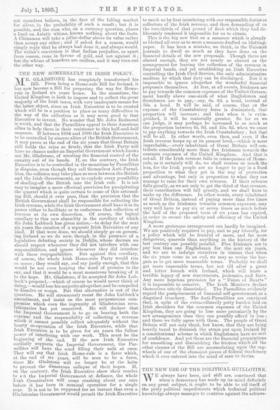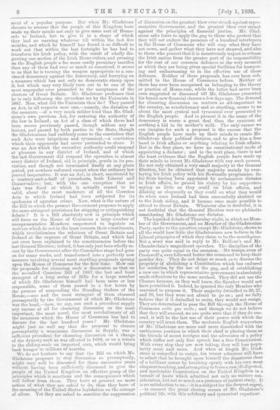THE NEW USE OF THE POLITICAL GUILLOTINE.
WE always have been, and still are, convinced that when a democracy has made up its mind definitely on any great subject, it ought to be able to rid itself of the petty political impediments which technical political knowledge always mane ges to contrive against the achieve- ment of a popular purpose. But when Mr. Gladstone ehooses to assume that the people of this Kingdom have made up their minds not only to give some sort of Home- rule to Ireland, but to give it in a shape of which they had no warning whatever till within the last five months, and which he himself has found it so difficult to work out that within the last fortnight he has had to transform his Irish policy, with the result of wholly dis- gusting one section of the Irish Home-rulers, and pressing on the English people a far more costly pecuniary sacrifice than any of them had ever so much as conceived, it seems to us that he is turning the weapon appropriate to a con- vinced democracy against the democracy, and hurrying on a measure which has not only no democratic stamp upon it, but which may very likely turn out to be one of the most unpopular ever presented to the acceptance of the electors of Great Britain.. Mr. Gladstone professes that he is only following the precedent set by the Unionists in 1887. Now, what did the Unionists then do ? They passed an Act, in all respects save one,—namely, the duration of the measure, —of a very much milder kind than Mr. Glad- stone's own previous Act, for restoring the authority of the law in Ireland ; an Act of a class of which there had been scores previously passed, though seldom any so lenient, and passed by both parties in the State, though the G-ladstonians had suddenly come to the conviction that such Acts were iniquitous and tyrannical,—a conviction which their opponents bad never pretended to share. It was an Act which the executive authority could suspend at pleasure in any district of Ireland, and of which the last Government did suspend the operation in almost every district of Ireland, old in principle, gentle in its pro- visions, and though not terminated finally at any given period, yet nowhere enforced except when the ordinary law proved inoperative. It was an Act, in short, sanctioned by a century-and-a-half of precedents, both Liberal and Conservative ; but, with the one exception that no date was fixed at which it actually ceased to be valid, about the most moderate of all the Coercion Acts to which Ireland had been subjected for its epidemics of agrarian crime. Now, what is the nature of the Bill to which the present Government proposes to apply the same stringent provisions for stopping or extinguishing debate ? It is a. Bill absolutely new in principle which will force on the House of Commons a large number of unrepresentative Members empowered to legislate on matters which do not in the least concern their constituents, which revolutionises the relations of Great Britain and Ireland at the expense of Great Britain, and which had not even been explained to the constituencies before the last General Election; indeed, it has only just been wholly re- cast by the Government after the Committee stage had gone on for many weeks, and transformed into a perfectly new measure involving several most startling proposals sprung upon the House of Commons for the first time. How can the proposals for closuring such -a discussion as that on the so-called Coercion Bill of 1887, the last and least stringent of a long series of Bills for a large number a which Mr. Gladstone himself had been more or less responsible, some of them passed in a few hours by the process of suspending the Standing Orders of the House,—one and the most stringent of them closured peremptorily by the Government of which Mr. Gladstone was the head,—how, we say, can such a precedent supply any excuse at all for closuring discussion on the most important, the most novel, the most revolutionary of all the measures which the House of Commons has had to discuss for the last hundred years ? Mr. Gladstone might just as well say that the proposal to closure peremptorily a wearisome discussion in Supply, was a sufficient precedent for closuring discussion on a change of the dynasty such as was effected in 1688, or on a return to the sliding-scale on imported corn, which would bring back hunger to millions of hearths. We do not hesitate to say that the Bill on which Mr. Gladstone proposes to stop discussion so peremptorily, might very well be discussed for three successive years without having been sufficiently discussed to give the people of the United Kingdom an effective grasp of the principles which it sanctions and the consequences which will follow from them. They have at present no more notion of what they are asked to do, than they have of the meaning of the United States legislation on the coinage of silver. Yet they are asked to sanction the suppression of discussion on the greatest blow ever struck against repre- sentative Government, and the greatest blow ever struck against the principles of financial justice. Mr. Glad- stone asks leave to apply the gag to those who protest that they will not endure the presence of a hundred interlopers in the House of Commons who will reap what they have not sown, and gather what they have not strawed, and also to those who protest that it is monstrously unjust to release the Irish nation from the greater part of its responsibility for the cost of our common defences at the very moment at which they are being given special facilities for hamper- ing and embarrassing us in the effective use of those defences. Neither of these proposals has ever been sub- mitted to the House of Commons before. Neither of them has ever been recognised as belonging to the theory or practice of Home-rule, while the latter had never been even suggested or discussed till Mr. Gladstone presented his brand-new financial clauses a few days ago. The demand for closuring discussion on matters so all-important to the country, so revolutionary and so startling, seems to us about the most cynical and tyrannical ever presented to the English people. And to present it in the name of the democracy is worse a great deal than the cynicism of seething a kid in its mother's milk. The only excuse we can imagine for such a proposal is the excuse that the English people have made up their minds to create Mr. Gladstone their political dictator, and to give him a free hand in Irish affairs or anything relating to Irish affairs. But in the first place, we have no constitutional mode of appointing a dictator ; and in the next place, there is not the least evidence that the English people have made up their minds to invest Mr. Gladstone with any such powers. He not only obtained a very small majority at the General Election, but he obtained that majority mainly by over- laying his Irish policy with his Newcastle programme. So far from having been appointed by acclamation dictator in Irish affairs, he gained his victory by his supporters saying as little as they could on Irish affairs, and dilating as eloquently as they could on what they would do when once Ireland had been successfully shunted on to the Irish siding, and it became once more possible to attend to Great Britain. Whatever else is doubtful, it is not doubtful that the General Election was no plebiscite constituting Mr. Gladstone our dictator.
The lopsided debate of Thursday night, in which no Mem- ber of the Government, and no Member of the Gladstonian Party, spoke to the question except Mr. Gladstone, shows to all the world how little the Gladstonians now believe in the Liberal principles of which they claim to be the mouthpiece. Not a word was said in reply to Mr. Balfour's and Mr. Chamberlain's magnificent speeches. The discipline of the party was quite equal to the occasion. No troops, even of Cromwell's, ever followed better the command to keep their powder dry. They do not deign so much as to discuss the propriety of abolishing a Constitution which has endured for centuries, by the use of the gag, and of establishing a new one in which representative government is absolutely made ridiculous by the same method. They did not use the Closure because, as they well knew, the Speaker would not have permitted it. Indeed, he ignored the only Member who ventured to propose it. Their majority dwindled to 29, 27, and 26, but they were not afraid to go ; and we fully believe that if it dwindled to units, they would not resign. They are determined to pass the Bill through the House of Commons eadte que mate ; and though we do not believe that they will succeed, we are quite sure that if they do suc- ceed, it will be the last use of their power with which the country will trust them. The moderate English supporters of Mr. Gladstone are more and more dissatisfied with the ambiguous position in which their chief is placing them as the friends of secret intrigue and the advocates of a policy which stifles not only free speech but a free Constitution. With every step they are now taking, they will lose popu- larity more and more. And when at length Mr. Glad- stone is compelled to resign, his truest admirers will have to admit that he brought upon himself the disastrous close of a brilliant career by breaking openly with his on most eloquent teachin g, and attempting to force a raw, ill-digested, and intolerable Constitution on the United Kingdom in a tumult of baste which admitted not only no mature con- sideration, but not so much as a pretence of patient study. It is no satisfaction to us,—it is a subject for the deepest regret, —to connect the great closing scenes of Mr. Gladstone's political life, with this arbitrary and tyrannical expedient.











































 Previous page
Previous page